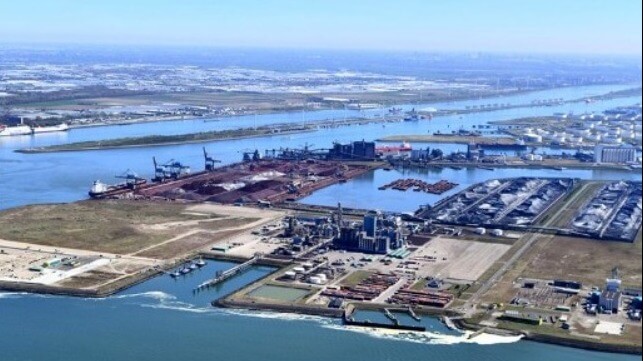Port of Rotterdam Says War and Economy Reshaped Business in 2022

Providing new evidence on the toll the war in Ukraine is having on the shipping industry, the Port of Rotterdam reported its nine-month results highlighting dramatic changes in its business. The war and resulting sanctions on Russia, changes to the energy market, and slowing consumer demand’s impact on container shipments, all contributed to the changes the port is experiencing in 2022. Europe’s busiest port and one of the busiest in the world, Rotterdam historically has been a hub for transshipments as well as the energy industry.
The Port of Rotterdam Authority reports that while freight volume was essentially flat year-over-year for the first nine months of 2022, there are some underlying major differences in the port’s traffic and operations. Further, they note with the war expected to continue and the current global economic outlook, that conditions are not expected to improve in the near term.
“The total volume makes it seem as if it is business as usual in the port, but the big changes, especially with respect to LNG and coal, indicate that the energy landscape has changed dramatically,” said Allard Castelein, CEO of Port of Rotterdam Authority. With the high energy prices, the energy-intensive chemical industry in particular is going through hard times. A faster energy transition makes us less dependent on geopolitical developments in the long term. In the short term, we have to do all we can to retain the chemical industry that is so important to our society.”
As a consequence of the sanctions, the port authority highlights that container traffic between Russia and Rotterdam has almost come to a standstill, compared to eight percent of overall traffic in the past. Further in part impacted by vessels behind schedule due to global congestion and delays at the terminals due to the high-capacity utilization, Rotterdam reports it saw an overall decline of more than four percent in TEUs or nearly nine percent by weight.
The throughput of iron and scrap decreased steeply (-17.9 percent), as did the throughput of agribulk (-14.8 percent). Other bulk, such as raw materials and building materials, however, increased sharply (+22.6 percent) as well as strong increases in both roll-on/roll-off traffic and other breakbulk (15 percent).
The biggest changes however came in cargoes related to the energy markets. Coal volume for example increased by nearly a quarter, primarily as more coal was used in power plants. The growth of LNG volume was very strong (+73.8 percent), as imports from the United States and other countries grew to replace Russian natural gas, which previously was piped to Northwestern Europe. Crude oil volumes are also up by more than five percent.
Commenting on the outlook, the Port Authority noted the weaknesses present in the macroeconomic climate along with the likelihood of the continuing war in Ukraine, inflation, and the deteriorated economic climate. “Nevertheless, the Port of Rotterdam Authority expects transshipment volume for 2022 to be of the same level as that of last year. Given the highly challenging circumstances in almost all sectors, this would be a remarkable performance of the Rotterdam business community.”
